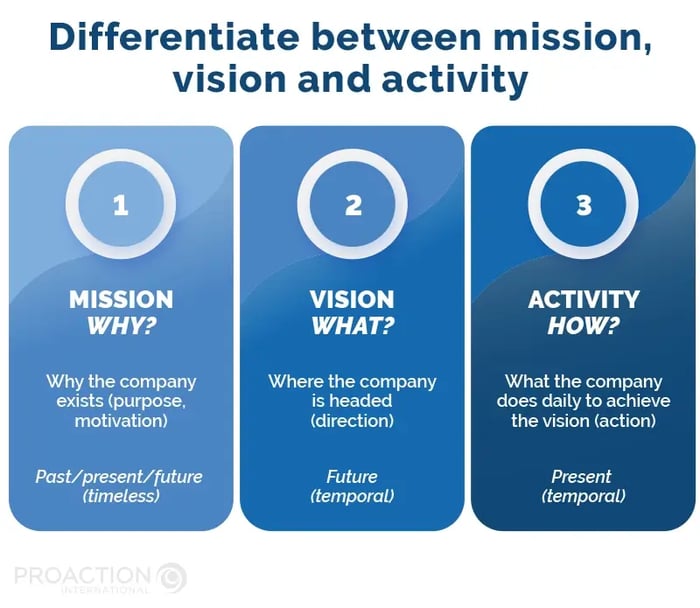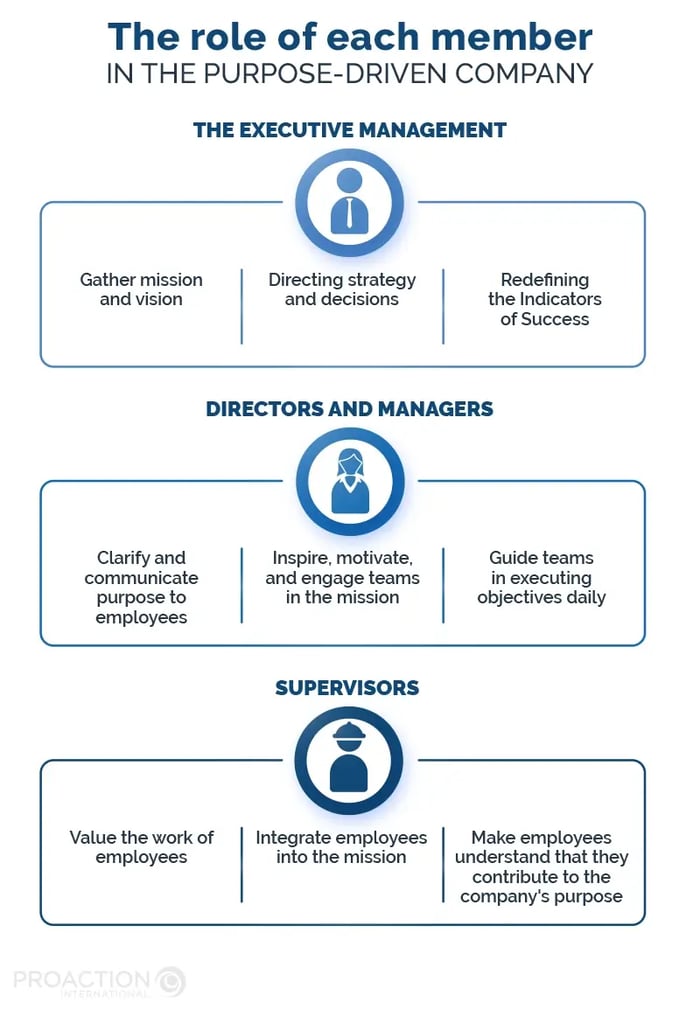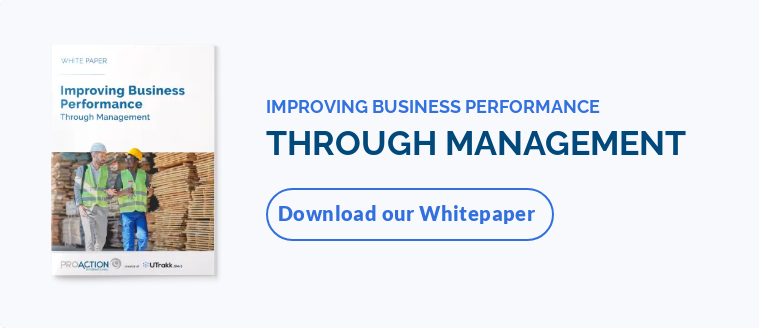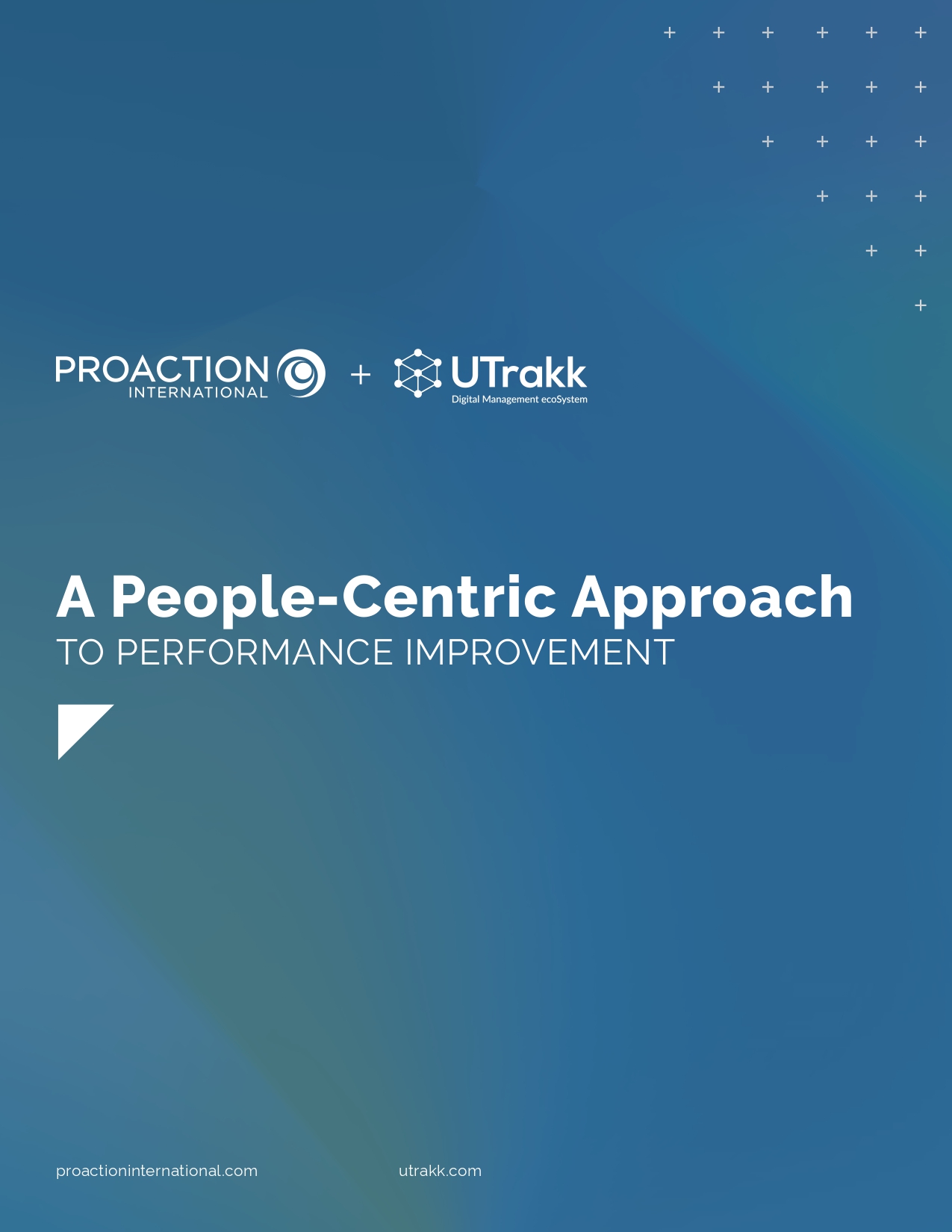What is a purpose-driven company?
First and foremost, it is essential to distinguish between business, vision, and purpose. All three exist within the company, but each asks a different question.
- The vision refers to the organization's image of the future, therefore, the direction it wishes to take by anticipating this same future. Question: What?
- The company's activity corresponds to the work it does every day and the means it uses to achieve the vision. Question: How?
These two factors can change and evolve according to several factors (management decisions, competition, Etc.).
- The purpose is the reason why an organization exists and its deepest motivations. It, therefore, refers to the ethical aspect and values of the company. It is timeless because it remains the same regardless of changes. Question: Why?

The emergence of the purpose-driven company status
The mission-driven enterprise is not new but has been genuinely conceptualized in the United States during the 21st century and then spread to other countries. Since 2010, it has required including a "purpose" in the company's articles of association.
The case of France
In France, the Pact Law of 2019 defines a mission-purpose company. This law requires commercial companies to consider societal and environmental issues about their activity in the Civil Code.
Also known as a "raison d'être" or "social interest" company, it is not a new legal status in itself, but rather a clarification the company needs to include in its legal status, as well as in the INSEE company database (SIRENE directory).
That means that its social and environmental objectives must be included in the company's articles of association and declared to the clerk of the commercial court. In particular, it requires the appointment of a mission committee and the verification of objectives by an independent third-party organization (ITO).
Examples of large French mission-driven companies include Danone, Mai,f and Groupe Rocher.
The principle of the purpose-driven company
Although the exact definition of a purpose-driven company may vary slightly from one country to another, the term generally refers to organizations that aim to reconcile economic performance with the general interest.
Beyond its profit-making purpose, the purpose-driven organization wants to be helpful from a social and environmental point of view. It wishes to make a profit but also contributes to something more splendid and deeply centered on human beings. It clearly states its purpose and does not hesitate to encourage people to act alongside it.
Being a company with a mission goes far beyond a simple initiative. It is about fully integrating the purpose in question, infusing it into every action, product/service, and stakeholder of the organization. It must be part of its DNA.
Why purpose-driven companies are becoming more important
A study by EY and the Said Business School at Oxford University found that public conversations about purpose increased fivefold between 1995 and 2014.
The numbers speak for themselves.
Communications agency Zeno conducted a global study on purpose-driven businesses in 2020, called The 2020 Zeno Strength of Purpose, with a panel of 8,000 consumers in eight countries. The results are pretty compelling and show that companies with a mission are highly valued by the public:
- 4 times more consumers are likely to buy from mission-based companies.
- 6 times more likely to protect the purpose-driven company in case of a misstep or public criticism.
- 4.5 times more likely to advocate for the mission-driven company and recommend it to friends and family.
- 4.1 times more likely to trust a purpose-driven company.
Here are some reasons for the public's growing enthusiasm for mission-based companies:
Lack of trust
In recent years, there has been a growing loss of consumer trust in businesses. That is particularly true for the new generations looking for values to hold on to and not just products/services to buy.
Social issues
Social inequalities and salary gaps between top management and employees continue to increase in companies. On the one hand, consumers want to invest in companies that have a social impact and are fair and respectful of human conditions. On the other hand, employees want more balance in remuneration and to be recognized for their fair value.
Sustainability
Frequent climate changes are increasingly affecting people's consciousness. Many consumers realize that they impact the environment and can act at their level by turning to companies invested in sustainable development.
How the purpose contributes to the success of the company
The purpose acts as a true catalyst for the company, positively impacting several levels.
1) Employee motivation
The purpose-driven organization motivates and increases employees' engagement by playing on the need to belong and on the human desire to participate as a whole. That leads the members of such an organization to collaborate by following a common objective and values that speak to them.
This type of company helps to federate teams, to make workers understand that their work is essential and that they make a difference. It is this impetus that will lead them to achieve personally and collectively and to give the best of themselves.
2) Better branding
Organizations need to have a good brand image. The purpose-driven brand inspires positive feelings through its values, actions, and social and environmental objectives. The changes in which it participates enhance its simple quality as a company
Acting as a magnet, it will naturally attract the trust of consumers and the employees around it.
It will also attract new talent looking for fair and inspiring organizations.
3) Better reputation with customers
Consumers are increasingly informed about the products/services they buy and the organizations themselves. We talk about image and trust above, but the idea goes further.
The company, with a mission statement, meets the needs of consumers (transparency, quality, fairness, respect for the environment) and shows very positive feedback. It adds a competitive advantage and consolidates its customer relationship by creating real value for them.
4) Better financial performance
According to research from the Harvard Business Review Analytic Services and the EY Beacon Institute, 58% of organizations that put their purpose first grow by more than 10%.
So yes, purpose-driven organizations generate more profit. There are several reasons for this.
- First of all, employees are more motivated and more productive. They're fearless in getting out there, taking the initiative, and being creative.
- Then there are the teams, which are more united and act as a single force to nourish the company's sense of purpose and grow it.
- Managers and senior executives are better at decision-making and implementing action plans aligned with the mission and best practices to ensure that the task becomes part of everyday life.
- Finally, from an external point of view, the positive image of the company with a mission brings it loyal customers who do not hesitate to invest in its products/services.
Numerous studies have shown that a purpose properly integrated into organizations brings immense value. Others link an embedded goal to high 10-year total shareholder return, increased employee engagement, retention, and higher productivity levels.
Ashley Grice (CEO, BCG BrightHouse)
Aside from these four significant benefits, mission-driven companies demonstrate a higher level concerning their ability to invest and adapt and better change management.
Becoming a purpose-driven company
The Role of business leaders and Managers in the Purpose-driven Enterprise
The CEO and senior managers play a crucial role here. First and foremost, they provide the impetus. They must be able to bring together the mission and vision and then decide on the business strategy, orientations, and indicators the company needs to set up.
The directors and managers will ensure to transmit the reason for being to the employees, inspire them, and get them on board with the mission. Then, they must be able to guide their teams in the right way in the execution of daily objectives to follow the guidelines set by senior management.
Front-line supervisors must value the employees' work in the field, make them part of the mission and understand that they contribute fully to the company's purpose.

Critical points for integrating purpose into the organization
- The purpose statement must be authentic, sincere, and specific to your organization and its values. It must be meaningful to all stakeholders within the organization, but also to customers. A company with a mission must be completely transparent about its actions and products/services.
- The corporate purpose must be very clearly defined so that the company can align every decision on it. Actions and decisions must be consistent with the mission.
- To set up your clear purpose, ask yourself how your organization will make a difference through the products/services it offers. What are its values, culture, priorities, and direction for the future? How do you solve a problem? How to improve things? These are the questions that will allow the implementation of a precise strategy.
- According to Ashley Grice (CEO, BCG BrightHouse), who talks about mission-driven companies in a Ted Talk, the purpose is naturally uncomfortable. Part idealism, part realism, requires resilience, adaptation, patience, and a strong will. Once the company sets the goal, it can take years to merge with the business entirely.
"Purpose lies at the intersection of who you are at your best and the role you have to play in the world. It comes from your philosophy. It is married to your aspirations, and because it is ethical, it is also timeless. [...] If you consistently put the purpose in place through culture, strategy, and brand over the years, it becomes muscle memory. It becomes a cultural norm."
Ashley Grice (CEO, BCG BrightHouse)
The challenges of the purpose-driven brand
There is a difference between wanting to do and doing. Unfortunately, many companies decide to set a mission and a reason for being but must implement it in their overall strategy.
This problem is mainly due to the ability of senior management and managers to cultivate this purpose daily, to integrate it into the corporate culture fully, and to make it a norm. However, combining long-term economic profit, consideration for the common good, and environmental awareness is a real challenge.
The purpose-driven company is not just a title. It is a state of mind, a way of being and acting within and outside the framework of its activity. It must become the identity of the organization. That implies a profound transformation of companies as they are not necessarily master these qualities and skills. Here, coaching and training can be helpful for leaders (executives and managers alike).
Without formally being a mission-based company, it is always possible (and advisable) to draw inspiration from this model to review your organization's priorities while giving it a more human and sustainable cheerful face.









